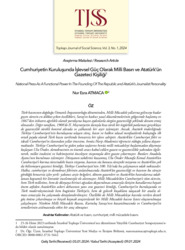Cumhuriyetin Kuruluşunda İşlevsel Güç Olarak Milli Basın ve Atatürk’ün Gazeteci Kişiliği
-
Yazar
Nur Esra Atmaca Durum
-
Tür
Makale
- Yayın Yılı 2024
-
Yayıncı
Topkapı Sosyal Bilimler Dergisi / Topkapı Journal of Social Science (TJSS)
- Dergi Topkapı Sosyal Bilimler Dergisi / Topkapı Journal of Social Science (TJSS) 3, ( 1 ), pp.25 - 48
- Tek Biçim Adres https://hdl.handle.net/20.500.14081/2000
-
Konu Başlıkları
Atatürk ve basın
Cumhuriyet
Milli Mücadele Basını
Türk basınının doğduğu Osmanlı İmparatorluğu döneminden, Milli Mücadele yıllarına gelinceye kadar geçen sürecin en dikkat çeken özellikleri, Saray’ın baskıcı yasal düzenlemelerinin gölgesinde başlamış ve 1867’den itibaren ağırlıklı olarak yurtdışına kaçan aydınlarla sürgün gazeteciliği şeklinde devam etmiş olmasıdır. Diğer taraftan, 1908’de II. Meşrutiyetin ilanıyla kısa süreli bir özgürlük patlaması gerçekleşse de gazetecilik sürekli kontrol altında ve çalkantılı bir seyir izlemiştir. Ancak, Atatürk önderliğinde Türkiye Cumhuriyeti’nin kuruluşuna ulaşan süreç, basın ve halkın ulusal menfaatlerde buluştuğu ilk ortak payda olarak Türk basın tarihinde benzersiz bir işleve sahiptir. Atatürk’ün Cumhuriyet fikri ve ideali Cumhuriyet’in ilanından yıllar öncesine, henüz Harp Akademisi öğrencisi olduğu yıllara dayanmaktadır. Türkiye Cumhuriyeti’ne giden yolun taşlarını henüz milli mücadeleyi başlatmadan döşemeye başlayan Ulu Önder, demokrasinin en önemli aracı kabul edilen gazete ve gazetecilikle yakından ilgilenerek, millet iradesini ve hakimiyetini önceleyen vizyonuyla dört gazete çıkarmıştır. Bunları Anadolu Ajansı’nın kurulması izlemiştir. Dünyanın takdirini kazanmış Ulu Önder Mustafa Kemal Atatürk’ün Cumhuriyet’i kurma sürecindeki basın vizyonu, basının söz konusu süreçteki misyonu ve Atatürk’ün çok da bilinmeyen gazeteci kimliği, Türkiye Cumhuriyeti’nin 100. Yılı’nda bu çalışmanın odak noktasıdır. Halka, cumhuriyet ve demokrasi fikrinin anlatılmasında Atatürk’ün gazeteciliği ve basının bu süreçte gördüğü benzersiz işlev yerli- yabancı arşiv belgeleri, dönem gazeteleri ve Atatürk’ün hatıralarına odaklanan kapsamlı bir literatür incelemesiyle ele alınmıştır. Milli Mücadele’den Cumhuriyet’e tüm sürecin, hem Türk milletine, hem de dünyaya birinci ağızdan duyurulması amacıyla iletişim kanallarına hayati önem atfeden Atatürk’ün askeri dehasının yanı sıra gazeteci kimliği, Cumhuriyet’in kuruluşunda ve Türk modernleşmesinde hem bugünün Türkiye’si, hem de gelecek kuşaklara ulaşacak bir analiz olması amacıyla bu çalışmada detaylandırılmıştır. Özellikle de Milli Mücadeleye basınla verilen destek göz önüne çıkarılmaya ve birçok kaynak araştırılarak bir Milli Mücadele basını listesi oluşturulmaya çalışılmıştır. Nitekim Milli Mücadele Basını, Kurtuluş Savaşı’nın kazanılmasında ve Cumhuriyet’in temellerinin atılmasında etkin bir araç olmuştur.
The most striking features of the period from the Ottoman Empire, where the Turkish press was born, to the years of the War of Independence are that it began under the shadow of the Palace’s repressive legal regulations and continued mainly in the form of exile journalism with intellectuals fleeing abroad from 1867 onwards. On the other hand, although there was a brief burst of freedom with the declaration of the Constitutional Monarchy in 1908, journalism remained under constant control and followed a turbulent course. However, the process leading up to the founding of the Republic of Turkey under the leadership of Atatürk has a unique function in the history of the Turkish press as the first common denominator where the press and the public met in the national interest. Atatürk’s idea and ideal of the Republic dates back to years before the proclamation of the Republic, when he was still a student at the Military Academy. The Great Leader, who started laying the paving stones of the road to the Republic of Turkey even before the start of the national struggle, took a close interest in newspapers and journalism, which are considered the most important tools of democracy, and published four newspapers with a vision that prioritized the will and sovereignty of the nation. These were followed by the establishment of the Anadolu Agency. The vision of Mustafa Kemal Atatürk, the globally admired Great Leader, in the process of establishing the Republic, the mission of the press in this process, and Atatürk’s lesser-known journalist identity are the focus of this study on the 100th anniversary of the Republic of Turkey. Atatürk’s journalism and the unique function of the press in communicating the idea of the republic and democracy to the public is discussed through a comprehensive literature review focusing on local and foreign archival documents, period newspapers and Atatürk’s memoirs. In addition to the military genius of Atatürk, who attributed vital importance to communication channels in order to announce the entire process from the National Struggle to the Republic both to the Turkish nation and to the world, his identity as a journalist is detailed in this study in order to provide an analysis that will reach both today’s Turkey and future generations in the establishment of the Republic and Turkish modernisation. In particular, the support given to the National Struggle by the press has been taken into consideration and a list of the National Struggle press has been tried to be created by researching many sources. Indeed, the National Struggle Press was an effective tool in winning the War of Independence and laying the foundations of the Republic.
-
Koleksiyonlar
Fakülteler
İktisadi İdari ve Sosyal Bilimler Fakültesi

 Tam Metin
Tam Metin

